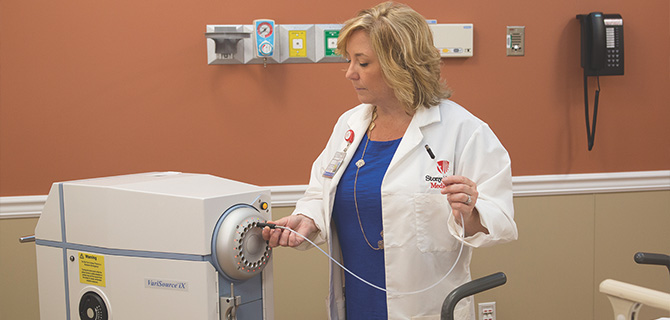This patient guide has been developed to answer some of the more common questions asked about radiation implant therapy.
What is the implant?
The intracavitary implant is a cancer treatment in which the radiation oncologist places radioactive sources directly into body cavities such as the vagina or uterus, using a specially designed applicator.
What are the advantages of an intracavitary implant?
This enables the doctor to provide a concentrated dose of radiation to the tumor with little damage to the surrounding normal tissue. This treatment can be used alone or in combination with external radiation or surgery to cure, control, or relieve symptoms caused by cancer.
Will the procedure hurt?
If you are taken to the Operating Room, you will receive anesthesia. If you are taken to the Radiation Oncology Department, you will be awake but drowsy. The sensation caused by the procedure is best described as "pressure" while the applicator is being placed and the vagina is being packed with gauze. The vaginal packing is necessary to keep the system in place and to separate the bladder and the rectum from the radioactive source. Medication is available to anyone who experiences discomfort.
What happens after the applicator is in place?
You will be required to transfer from the stretcher to the CT room. Staff members will be there to assist and direct you. After the CT scan, you will be taken back to the treatment room, and the medical physicist will generate a treatment plan for you.
Will my activity be limited while the applicator is in place?
You will be required to maintain complete bed rest while the applicator is in place. Avoid any sudden twisting or turning.
What happens when the applicator is removed?
After the treatment, your doctor will remove the vaginal packing and applicator as well as the foley catheter is then removed. The procedure is relatively short and you may have medication prior to it if you wish.
It is important for you to know that there is no residual radiation left after the implant is removed. You are not radioactive. You will be given another enema to start your bowels working again and another vaginal douche to cleanse the vaginal tract.
Someone will help you up and assist you while you walk in case you get lightheaded after being in bed for this time period. You may go home as soon as this is completed.
What should I do when I'm home?
-
There may be light spotting and discharge for several days or weeks after the implant. Heavy bleeding, foul-smelling discharge, or fever should be reported.
-
Do not use tampons, use peripads (sanitary napkins) instead.
-
Shower in place of baths.
-
Irrigate your perineum, using your peri bottle and warm soapy water, after each bowel movement.
-
If the heavy discharge is bothersome, you may douche using 1 teaspoon of white vinegar in 1 quart
-
Fatigue may persist for a few days. Get plenty of sleep at night and engage in moderate exercise to regain strength.
-
Normal bowel routines may take several days to return.
To treat constipation, drink at least 8-10 glasses of fluid a day. Eat a high residue diet -- fruits, vegetables, bran, prune juice, etc., and use a stool softener if necessary.
-
To treat diarrhea, eat a low residue diet -- white bread, cooked fruits and vegetables, pasta, rice, etc., and use Immodium as directed if necessary.
-
Urinary tract discomfort, burning, and frequency, are expected. Drink plenty of fluids and report any foul-smelling urine.
-
Sexual intercourse may be resumed in 2 to 3 weeks. Your vagina may be dry so use plenty of water-based lubricant such as KY Jelly®.
-
If you are not sexually active, we will provide a vaginal dilator for you to use after one-month follow-up. It is important to keep the walls of the vagina open. Lying on your back with your knees bent, insert the well-lubricated rounded tip of the dilator into the vagina for 5-10 minutes, three times a week. Even with dilatation, the walls of the vagina shorten and close somewhat. Without it, the walls will seal off and prevent examination.


